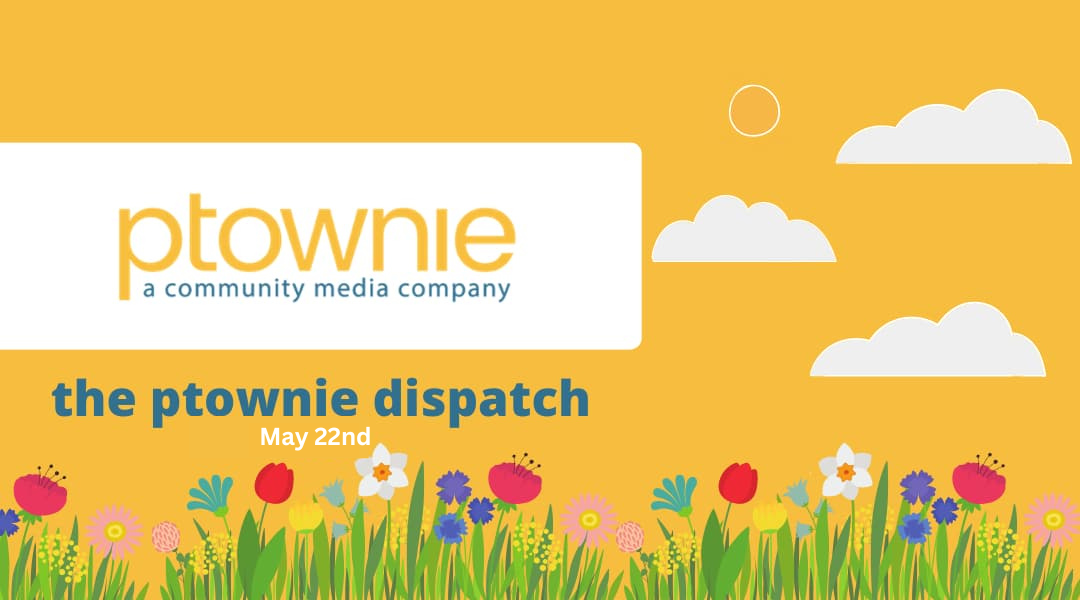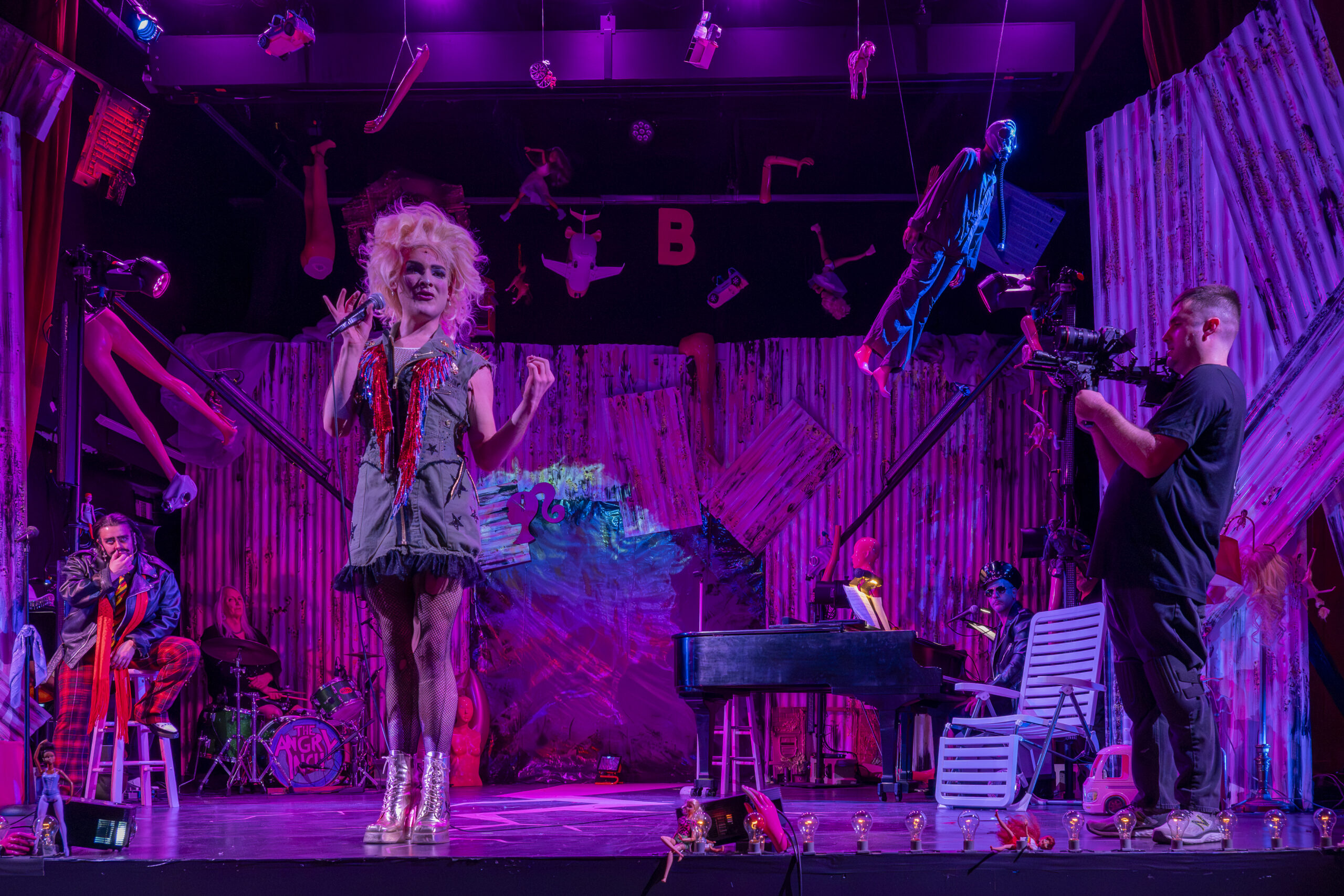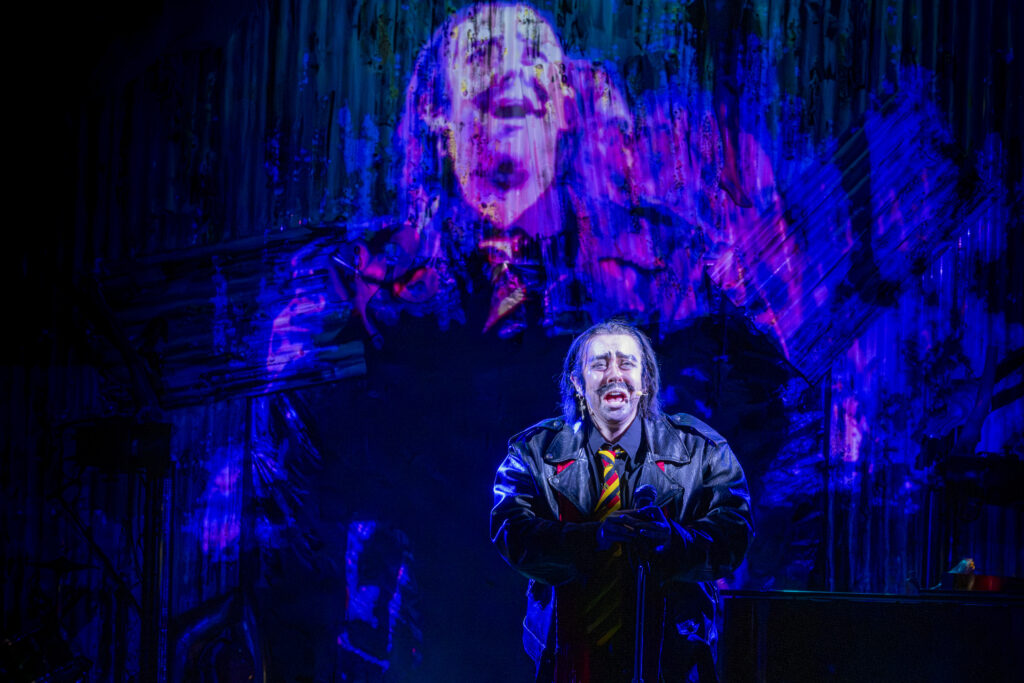
Finding Your Way Home: Hedwig and the Angry Inch

It’s the lights you notice, first.
Finding your seat in Fishermen Hall in Provincetown for Peregrine Theatre’s production of Hedwig and the Angry Inch, you immediately feel part of the set: bright stage lights are rotating, à la police-cruiser strobes, first illuminating the audience and then plunging it into darkness. And that’s a suitable metaphor for the story: this isn’t the typical rise-and-fall narrative one expects from life stories told onstage, but rather a rise, fall, fall even more (as Beckett might say, “fall better”), and ultimately rise a different creature altogether, still struggling to find its wings but determined and alive.
Hedwig (Alec Diem, showing more nuanced depth than seems possible) is a self-proclaimed “slip of a girly boy” named Hansel Schmidt who grew up in communist East Berlin. Now called Hedwig and on a bare stage with her band, she recounts her journey: falling in love with an American GI and coerced by him into having gender-reassignment surgery in order to marry and emigrate to the States. The operation goes wrong, leaving Hedwig with an “angry inch” that leads her to explore gender fluidity and queerness, her place in the world, and who she might someday dare to become.
Abandoned by her soulmate and song collaborator Tommy Gnosis (said, in a nod to the community, to be currently appearing at Provincetown Town Hall), Hedwig is now accompanied onstage by her second husband, Yitzhak (Ash Moran in a tricky role that showcases their extraordinary vocals), a Croatian drag king who is backup singer, assistant, and clearly codependent partner.
The local references, delivered primarily at the beginning as a sort of warm-up, are appreciated by the audience (as are the raunchy blowjob jokes), but it’s the combination of cabaret-style high-camp monologue with kick-ass songs ranging from ballads to punk rock that keeps the momentum going and the energy high.
Not that these performers need anything to boost their energy levels, which are intense. Diem in particular is extraordinarily physical: he projects both strength and flexibility but allies them with graceful, feminine, even cat-like gestures and poses. Both Diem and Moran bring versatile and truly exceptional vocal performances to the stage, ranging from bluesy to pop to raspy underground punk. Neither is capable of a false note, and both have seemingly effortless vocal ranges.
Stephen Trask’s songs are the vehicles that deliver the story, sometimes at breakneck speed. The Angry Inch band, composed of pianist Skszp (musical director Yaron Spiwak) and musicians Jacek (Cliff Letsche, on bass), Krzyzhtoff (Keb Hutchings on guitar), and Schlatko (Rikki Bates on drums), is everything a ‘90s stage band should be and more. And Chris Page’s well-calibrated sound design never allows it to overwhelm the singers or block any of their vocals. In Wig in a Box, audience members get to sing along with gusto (some are possibly old enough to remember the bouncing ball of Sing Along with Mitch, reprised on the back screen here); in The Long Grift, Moran takes center stage to deliver passion and blues; and in Sugar Daddy, Diem and Moran’s voices belt out exceptionally perfect harmonies with a fast-packed rock number that sets toes tapping.
Longtime Peregrine director and choreographer Kyle Pleasant proves here that he’s as deft with two actors as he is with the supersized casts of Cabaret and Hair, and his direction is bolstered by the skills of a whole creative team—costume designer Seth Bodie, lighting designer Michael Clark Wonson, makeup designer Chad Hayduk, video designers Kathy Wittman and Justin LaHue, wardrobe supervisor Jonathan Peters, and stage staff/tech Carolyn Collins, Aspen Davis, Chan Varon Collins, and Klara Ballay.
Thea Goldman’s stage design—eclectic, rundown, punk—is enhanced by the projection on the back wall of images of the performers as one might see at Glastonbury or other large venues; the fact of it being used in a more intimate cabaret setting (and shout-out to Will Oxtoby as the Camera Operator) is slightly jarring (he was, Hedwig explains, the only one to answer her Craigslist ad) but underlines a certain need for self-documentation, to observe a life even as one is living it.

In the end, both Yitzhak and Hedwig experience metamorphosis, Hedwig by stripping off the layers of glitter and rouge, and Yitzhak by transforming gleefully from drag king into drag queen.
This story, for all its glaring specificity, finally is universal: it’s about finding your way home. Rolling Stone magazine once called it “the best rock musical ever written,” but that description does it poor service. Defining it as a drag performance does the same thing, because the drag here is metaphoric. Creator John Cameron Mitchell said, “The real test comes when we drop that and we see what’s underneath, including the scars, including the complexity of what [we’ve] been through … There’s an understanding that perhaps she can let go of the bitterness, let go of the victimhood, maybe even let go of the drag. Let go of the pronouns, let go of whatever.”
That resonates in the world of today just as it did when Hedwig was first performed in 1998. The juxtaposition of poignancy and humor may provide the balance we need in 2024 to navigate our own journeys, and this isn’t a bad blueprint. Self-acceptance is a long and difficult journey, especially for those whose gender or sexuality has been marginalized. But if Hedwig can survive repeated heartbreak, living in a world whose norms tell her she’s a misfit, professional failures, a botched gender reassignment operation, even a trailer park in Kansas… then there is, perhaps, hope for all of us.
Peregrine Theatre Ensemble has done it again, producing an experience that’s both profoundly moving and highly entertaining. Fun that leaves you thinking… what could be better?
review by Jeannette de Beauvoir
photos by Michael and Susan Karchmer
Peregrine Theatre Ensemble presents Hedwig and The Angry Inch
July 5-August 31 Wednesdays-Saturdays
Tickets at peregrinetheatre.com
Listen to the cast interviewed on Arts Week on WOMR
More Recent Provincetown News




 Accommodations
Accommodations  Art
Art  Bars
Bars  Books
Books  Entertainment
Entertainment  Events
Events  Featured
Featured  Guides
Guides  History
History  Literary stuff
Literary stuff  Most Popular
Most Popular  Provincetown News
Provincetown News  Restaurants
Restaurants  Reviews
Reviews  Shopping
Shopping  Theatre
Theatre  Uncategorized
Uncategorized  Weed
Weed